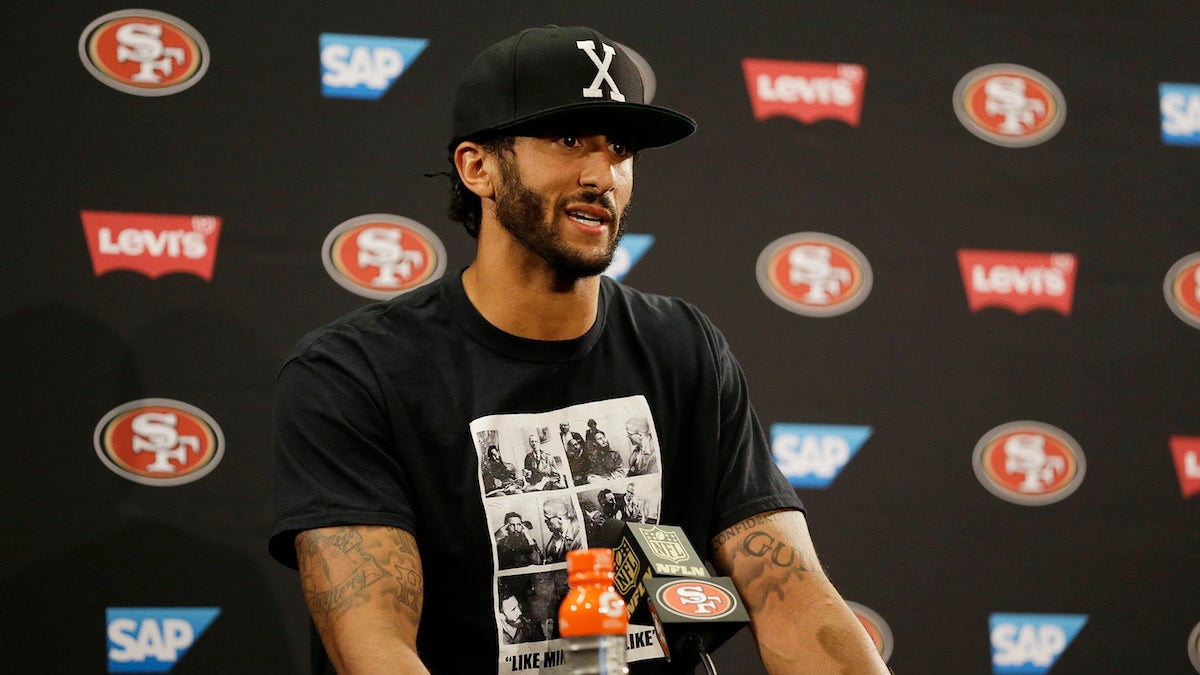Colin Kaepernick, Dwayne from Swedesboro, and the truth about race in sports

San Francisco 49ers quarterback Colin Kaepernick answers questions at a news conference after an NFL preseason football game against the Green Bay Packers Friday, Aug. 26, 2016, in Santa Clara, Calif. (AP Photo/Ben Margot)
Race stands at the intersection of media and sports in America. If that truth has ever been in question, the events of the last week should erase all doubt.
First, we learned that a modern-day iteration of the Jim Crow-era radio show, “Amos ‘n Andy,” had been revived in Philadelphia. A white radio producer at Philadelphia’s 97.5 The Fanatic spent months calling the station’s most popular show as “Dwayne from Swedesboro,” a fake black character awash in racial stereotypes.
Then on Saturday, Colin Kaepernick, one of the National Football League’s few black quarterbacks, sat during the national anthem at a pre-season game in San Francisco. Asked to explain his actions, Kaepernick told NFL Media, “I am not going to stand up to show pride in a flag for a country that oppresses black people and people of color. To me, this is bigger than football and it would be selfish on my part to look the other way. There are bodies in the street and people getting paid leave and getting away with murder.”
Kaepernick was roundly criticized as unpatriotic after taking that stand for blacks like Freddie Gray, who died of a spinal injury after police officers failed to secure Gray with a seatbelt in the back of a police van. Though Baltimore’s coroner called Gray’s death a homicide, the officers escaped conviction and several have received back pay.
So yes, Kaepernick has a point, and the fact that he is a black quarterback underscores that point better than most Americans know.
Quarterback, you see, is among the most important leadership positions in American sports. And American sports—from the media who cover it, to the owners, managers and coaches who oversee it—has long embraced institutionalized racism in one form or another.
In the 1920s, when pro football was in its infancy, American racism was at its zenith. President Woodrow Wilson had just re-segregated the federal government. “Birth of a Nation,” the 1915 film by D.W. Griffith, had spurred unprecedented growth in the Ku Klux Klan. And the NAACP was engaged in an anti-lynching campaign to fight the race-related murders of black men.
Against this backdrop, Fritz Pollard, a Brown University alumnus, became the first black football coach in the league that would later become the NFL. Pollard was a brilliant runner and football tactician who went on to become the first black quarterback in the league.
Despite the achievements of Pollard and others, the NFL instituted a ban on black players in 1933.
But the racism in American sports is about so much more than football. It is, at its core, about fear. The fear that blacks would prevail if they could compete on the level playing field of sports. The fear that black athletes would obliterate the artificial dividing lines of race. The fear that black competitors would disprove the core tenets of white supremacy.
That’s why, when Colin Kaepernick sits down to protest the continued unequal treatment of blacks in America, it’s bigger than a single man’s reaction to a song at a football game. It’s about history that can’t be ignored.
For every Jack Johnson who fought his way to the heavyweight championship in the 1910s, there were black men who were lynched for even aspiring to such a goal. For every Fritz Pollard who excelled in professional football, there were scores of black players who were banned from the league. For every Hank Aaron who broke Babe Ruth’s home run record, there were segregated communities where black children had no access to baseball diamonds.
The decades of race-based exclusion thwarted the careers of black athletes before they could begin, and even now, firm barriers remain. That’s why only 6 of the 32 projected NFL starting quarterbacks this year is black. It’s why, despite an NFL rule forcing teams to interview minority candidates, there are only 5 black head coaches and one Latino in the league.
But the effect of race on sports goes well beyond those who take the field. It exists in the media, as well, primarily because white males dominate sports journalism and entertainment, and their racial attitudes often spill into the coverage.
In 1988, Jimmy “The Greek” Snyder felt comfortable in saying that enslaved Africans were bred by slave holders to be better athletes than whites. He was fired from CBS Sports for the comment.
However, things have changed since 1988. Racially insensitive coverage is now tolerated at far too many outlets, and in Philadelphia, it seems such behavior was encouraged at 97.5 The Fanatic.
I am aghast that a white sports producer in a major media market was allowed to create and voice a stereotypical black character with the knowledge of his superiors. While the station’s management has promised to issue an apology, and imposed three-day suspensions on those involved, token punishments aren’t enough.
We must face the truth.
The history of racism in American sports is what allows a white producer to demean black people. That same history produces sports reporters who castigate Colin Kaepernick for demanding black justice.
But if Kaepernick’s critics truly believe in the principals of American freedom—principals that have too often been violated in sports culture—perhaps they should stop denigrating him for exercising his right to protest.
Perhaps they should stand up and applaud.
Listen to Solomon Jones weekdays from 7 to 10 am on 900 AM WURD
WHYY is your source for fact-based, in-depth journalism and information. As a nonprofit organization, we rely on financial support from readers like you. Please give today.


